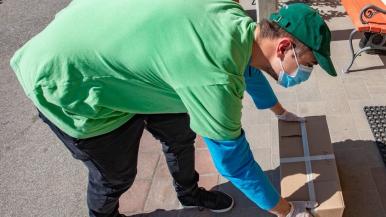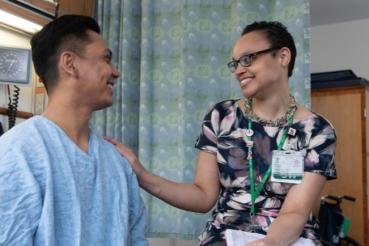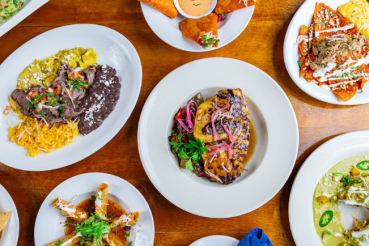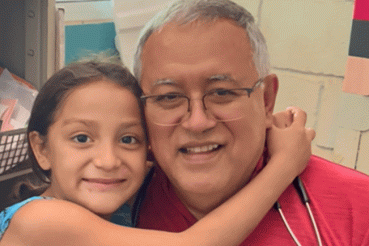Rush's West Side neighborhoods include some of the populations who are at the greatest risk from COVID-19. To ensure these communities don't fall through the cracks during this health crisis, Darlene Hightower, JD, vice president, Rush Office of Community Health Equity and Engagement (CHEE), “put the bat signal out" and gathered together a number of departments across the Rush system to stand up a Community Command Center in late March.
“We have an amazing group of talented and engaged employees across Rush who are already committed to supporting our West Side neighborhoods," Hightower says. “This is an effort to harness all of that expertise to strategically address COVID-19, which has severely impacted our surrounding communities."
The Community Command Center meets once a week on a Webex video conference call to discuss what the community needs are and how the team can best address those needs. These calls have resulted in a number of useful initiatives that support Rush’s West Side anchor mission areas.
Listed below are just some of the projects that the Community Command Center team has quickly developed and implemented.
COVID-19 Community Resources page
The needs of the community change quickly during this health crisis. To be more responsive to those needs, the CHEE team developed a COVID-19 Community Resources page in the Rush in the Community section of the Medical Center’s website. The page organizes content by categories of need, with regularly updated information.
Resource topics range from food and mental health to support for the LGBTQ population and undocumented immigrants. It also addresses how community partners can get free access to Now Pow, a digital referral platform Rush social workers and community health workers use to ensure community members' needs are met with regard to the social determinants of health.
If you know of any additional resources that may be useful for the community, please contact CHEE@Rush.edu.
Ask a Doc webinars
Twice each week, CHEE hosts free 30-minute question and answer Webex sessions about COVID-19, which are open to the community. One session is held in English, and the next session is held in Spanish. The theme of the sessions varies each week. A recent Q&A, for example, focused on mental health and coping skills during the pandemic.
Each moderated session features Rush experts offering tips on the topic and answering questions from the community. To join these webinars, visit the COVID-19 Community Resources page. Please feel free to share this information with community members and send questions to be answered during the Webex to CHEE@Rush.edu. For past recordings of these sessions, visit (and Like) CHEE's Facebook page.
Food assistance programs
Rush employees have been eager to volunteer in support of our West Side communities during the pandemic, and the Rush Employee Volunteer Program gave them the opportunity to provide food assistance for those in need in anchor mission neighborhoods. The program offers in-person volunteering opportunities for employees, and in past weeks offered virtual opportunities to help those who were food insecure get connected with resources. In more recent weeks, with looting leaving neighborhoods without food sources, employee volunteers are helping with food distribution to community members and employees who live in these neighborhoods as well.
Employees providing phone support received training on how to make calls to connect community members with resources and conduct those calls twice over the course of the month. Food delivery is done through Rush community partner Top Box, with meals delivered to West Side residents.
The goal of the ongoing effort is ensure a sustainable program for community members where volunteers can connect those in immediate need with food supplies and then work with them to get the resources they need to support them going forward.
CHEE community newsletter
To stay more closely connected to our community partners, CHEE launched a community newsletter in April. This bimonthly publication shares news that affects Rush’s anchor mission neighborhoods, highlights resources that help support them and features stories aimed at various populations within these communities, such as older adults.
If you have story ideas or know of resources that might be useful, please send them to CHEE@rush.edu
Social work help line
Social workers are an invaluable bridge between community members and resources at Rush and in the community. To strengthen that channel, a social work help line was created that allowed callers to reach social workers who could help with a variety of needs, including coping with stress and connecting to any community benefits to make this period a bit more manageable.
Support groups
Managing feelings of isolation can be one of the most challenging parts of social distancing and sheltering in place. Just hearing someone's voice over the phone can be helpful. With that in mind, the telephone support group on “Coping and Connection in the Time of COVID" was born.
The group meets via telephone each week on Wednesdays and Fridays from 2 to 3 p.m. The dial-in number is (312) 535-8110, and the access code to join the call is 928 919 117.
Each call-in group is co-facilitated by two licensed Rush social workers and is available for free to Rush patients, their families and community members.
Another support group is the CHEE Facebook page, which shares community events and resources that residents will find supportive during this time
Homeless COVID-19 Coalition
To learn more about how Rush along with other Chicago hospitals and community outreach organizations are supporting the homeless, please read “Rush Health Equity Expertise Prepares Homeless, A Safe Haven for COVID Response” and “Rush Leads Partnership to Protect the Homeless During COVID-19."
COVID-19 Community Response Playbook
Many organizations that regularly support communities are trying to navigate unchartered and incredibly challenging territory during this health crisis. With so many areas across the Rush system cross-collaborating to develop solutions to ensure our communities remain safe, it only made sense to create a guidebook on how to effectively respond to the community as an organization.
The Community Command Center team has just completed this guidebook, which is available on the Medical Center's website.
“Although Rush has deep connections with community partners and residents and has already made commitments to the West Side through our Anchor Mission Strategy, there's still more work to be done," Hightower says. “This pandemic lets us know we have to build even stronger connections by investing more time in the people who live in our most vulnerable areas. That's the way forward. We really are better together."




